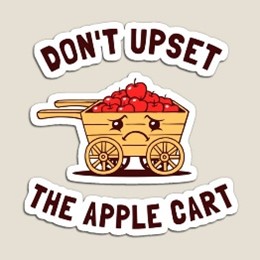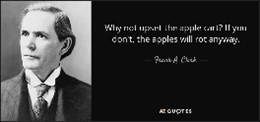Are you looking for a way to tell someone to get back in line and stop being disruptive? If so, you could use the saying, "don't upset the applecart." This post unpacks the meaning and origin of this expression.
Meaning
If you "upset the applecart," you disrupt the normal order of things. Typically, you're creating difficulty for other people around you by inquiring about something or taking a set of actions against what is best practice.
If someone asks you to stop upsetting the applecart, they mean for you to cease and desist with your actions. They want you to stop what you're doing and return to normal or leave their presence so they can carry on with no change.
To upset the applecart is to change people's plans or expectations in a way that they don't expect and don't appreciate. It's telling people that you don't care about their role or involvement in the situation.
Example Usage
"Why are you always asking questions? Don't upset the apple cart. We had a good thing going here until you arrived."
"Don't upset the apple cart. Just keep your head down and do as you're told, and you'll be fine, I promise."
"Who told you that it was okay to start telling Cindy about where I was last weekend. Don't upset the apple cart. Are you trying to ruin my relationship or something?"
"We told you not to upset the apple cart, but you had to do it anyway. Now we're all going to pay the price of your stupidity."
"Don't upset the apple cart they said. It will be fine, they said. So, I got fired last week for being disruptive. Maybe I should have listened to the advice."
"Why do you want to upset the apple cart here, guy? Are we not doing anything wrong? There's no need to play whistleblower on the whole thing and bring it to the ground."


Origin
The expression "don't upset the apple cart" originates from its former iteration, "upset the cart." The saying dates back to the Roman Empire, where it had a similar meaning as what we use it for today. The earliest appearance in the English language comes from around the 1700s.
Its transition into English saw the phrase change to the current format of "don't upset the applecart." While language experts remain somewhat divided on the true origin of the saying, its first appearance in print comes from Jeremy Belknap in his work, "The History of New Hampshire," published in 1788.
"Adams had almost overset the applecart by intruding an amendment of his own fabrication on the morning of the day of ratification [of the Constitution]."
Phrases Similar to Don’t Upset the Apple Cart
- Keep your head down.
- Don’t ask questions.
- It is what it is.
Phrases Opposite to Don’t Upset the Apple Cart
- Be disruptive.
- Don’t stick to the rules.
What is the Correct Saying?
- Don’t upset the apple cart.
Ways People May Say Don’t Upset the Apple Cart Incorrectly
The phrase has nothing to do with carts or vehicles. Using the expression to describe halting the action of capsizing a boat would be incorrect. The “cart” is the current order of things, and “upset” is to illicit an unwanted reaction from the person or entity governing that order.
Acceptable Ways to Phrase Don’t Upset the Apple Cart
You can use the phrase “don’t upset the apple cart” when you’re telling someone to stop causing problems that could derail your progress or success or result in anger or distress. It suits professional and social conversations.
You could use it at home when a friend tells you to stand up to your partner. Or you could use it at work when your boss tells you to stop making useless recommendations to management. The phrase can describe situations with serious repercussions for upsetting the current order or minor infractions as punishment.